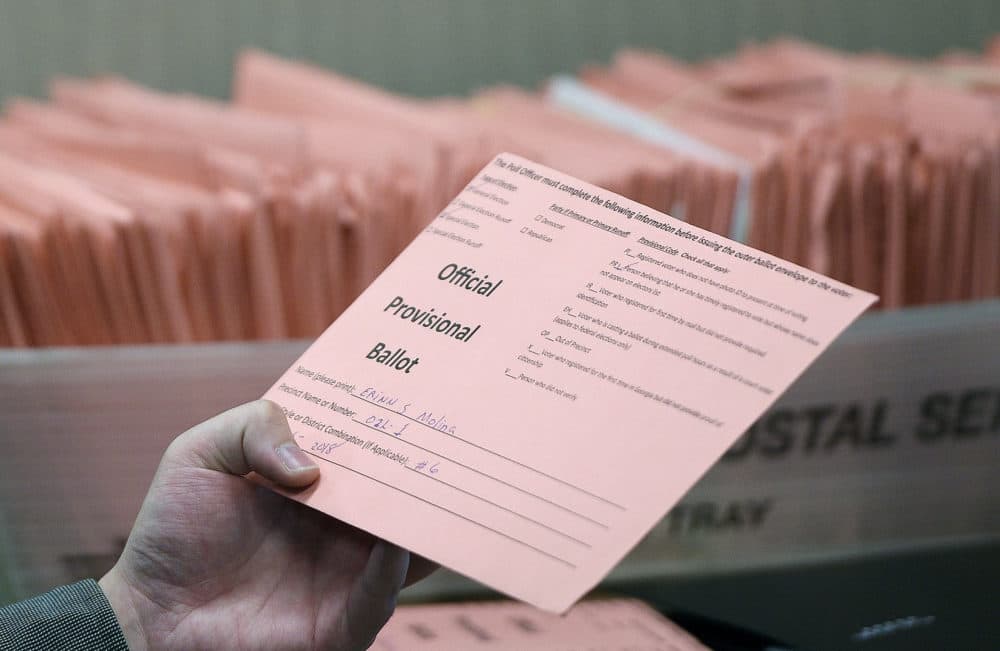Advertisement
commentary
Provisional Ballots Protect The Right To Vote. It’s A Way To Ensure Every Vote Is Counted

The balloons have dropped on most campaigns in this year’s midterm elections, but some races have yet to be decided — and might not be for weeks. Lawsuits are already flying in the contest for Georgia’s governor and also in Florida, where several races are headed for a recount.
President Trump, in a tweet on Friday, criticized the ongoing vote counts, accusing Democrats of continuing to find votes days after the election.
Florida Gov. Rick Scott, the Republican candidate for Senate, accused the Democrats of fraud. What both he and Trump fail to mention, however, is that most of the votes being counted are provisional ballots, which are a perfectly legal part of our electoral process.
Provisional ballots only get attention in close races like those this year in Georgia, Florida and Arizona. These ballots may lead to delays in declaring an ultimate winner, but they are an important — though not the only — tool in the effort to expand voting rights.
A provisional ballot is used when an individual’s eligibility to vote is in doubt. This happens most commonly when a potential voter’s name is not on the official list of registered voters. The individual is asked to complete a provisional ballot, kept separate from the regular ballots, and is not counted until election officials confirm that he or she is legally registered to vote. That takes time and delays vote tallying, as we are now seeing. But is necessary to guarantee that no one is denied their right to vote because of an administrative error.
In Arizona registered voters who fail to show the appropriate identification must complete a conditional provisional ballot. Their vote will be counted if the voter produces the required ID by Nov. 14 — more than a week after Election Day. (On Monday night, after several days of ballot counting and controversy over rural county results, Kyrsten Sinema defeated Martha McSally in the highly contested Arizona Senate race.)
In 2002, after the 2000 presidential election debacle, President George W. Bush signed into law the Help America Vote Act (HAVA). The law required most states — with six exceptions -- to allow provisional voting. (Before HAVA, only 17 states and the District of Columbia permitted it.) More than 10 million provisional ballots were issued in the United States between 2006 and 2016, according to the U.S. Election Assistance Commission. Of these, more than 7.3 million were counted.
... those who criticize provisional voting -- and the delays that it brings -- should instead push all states to adopt early voting and automatic voter registration.
Arizona, California, Ohio and Nevada topped the list of states with the highest number of such ballots. Their use varies across the country, since states set their own rules on when provisional ballots can be used and when they will be counted. The most common reasons for rejection were that the voter was not registered or was attempting to vote at the wrong precinct. As the numbers attest, however, millions of voters would have been disenfranchised without the option to vote provisionally.
I recently returned from volunteering on the voter protection team for the Arizona Democratic Party. (I have volunteered in a similar capacity in other states since 2008.) I worked with volunteer lawyers who are inspirational in their commitment to ensuring that those eligible to vote can do so. Our efforts ranged from the administrative but important work of helping voters, many voting for the first-time, find their polling locations, to the more complex task of helping them understand the complicated Arizona voter ID law.
I also helped the Election Day poll observers at polling locations throughout the state to ensure the smoothest and fairest possible administration of the right to vote. It is not easy work, but it's essential as voting laws become increasingly more restrictive throughout the country.
Provisional voting has its critics, who argue that it encourages inefficiencies in the administration of elections because it delays the vote count and discourages officials from maintaining accurate, up-to-date voter lists. Officials figure, the argument goes, they can fix mistakes on their voter lists if voters show up at polling places and challenge them. I agree with the administrative argument, but the answer is not to stop counting provisional ballots, as President Trump and Gov. Scott seem to be urging -- at least in cases that don’t benefit their party. That would disenfranchise millions of individuals nationwide who are entitled to vote and merely victims of administrative error.
Instead, those who criticize provisional voting — and the delays that it brings -- should instead push all states to adopt early voting and automatic voter registration. While these measures won't completely eliminate provisional ballots, they will reduce the numbers used. Early voting gives voters and election officials more time to fix administrative errors. Automatic voter registration, recently adopted in Massachusetts, adds eligible voters who interact with state government to the rolls without the need to register formally (unless they opt out). This will address some errors and delays in the registration process.
Provisional ballots are an important tool to ensure that the voices of eligible voters are heard, but, as a nation, we should not stop there in our efforts to expand access to the voting booth. Massachusetts has demonstrated that states can take additional steps to make our voting process more efficient and accessible, which should be our ultimate goal. We are all anxious to get to the balloon drop, but speed should not come at the expense of protecting the right to vote.
